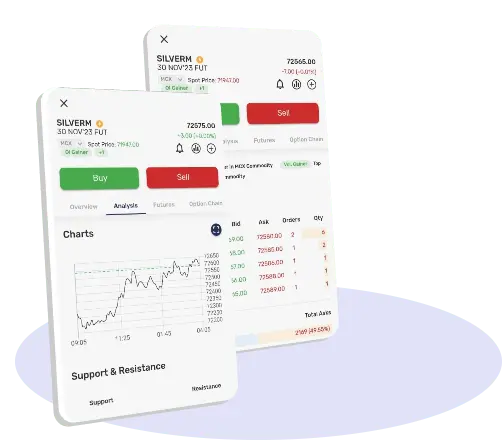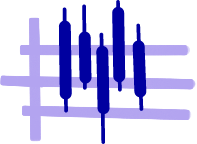Unmatched features that commodities traders enjoy with PL Capital App

Unmatched features that commodities traders enjoy with PL Capital App
Real time market scanners for insightful pre-trading analysis
Optimise strategies with put call ratio, open interest and volatility analysis
Establish precise stop – loss orders using support & resistance tools
Smart alerts for timely actionable trades
Trade seamlessly on Advanced Option Chain
Use margin calculator to check margin required
The illustrated prices are of near future contracts
Commodities can be classified into
Cotton, Coffee, Guar Seeds, Jeera, Soybean, Wheat, Rubber, Sugar, Corn, Pulses, Spices, etc
Crude Oil, Natural Gas
Gold, Silver, Copper, Aluminium, Zinc, Brass, Iron, etc
Commodity trading involves the buying and selling of various commodities and their derivative products.
Commodities are the raw materials or resources which are used for consumption or used to produce refined goods. They are divided into 2 broad categories:
- Soft commodities: commodities with a limited shelf life mainly agricultural commodities like wheat, soybean, cotton, corn etc
- Hard commodities: commodities which are natural resources like metals, crude oil, etc
In India, these commodities are primarily traded on exchanges like MCX, NCDEX, ICEX, among others.
Like stock trading, commodities trading in India takes place via exchanges. The two primary exchanges are MCX (Multi Commodity Exchange) and NCDEX (National Commodity & Derivatives Exchange).
Market participants can buy or sell various commodities at the current or future date.
Commodity market participants include producers, consumers, traders, speculators and investors. Producers and consumers of commodities use the market to hedge against price fluctuations, while traders and speculators aim to profit from price movements. Investors include those looking to diversify their portfolios with commodities.
Traders or investors can place their buy or sell orders through registered brokers like PL and use our online trading app, PL DigiTrade for it.
The primary instrument for trading in commodities in India is futures contracts. These contracts specify the quantity, quality, and delivery date of the commodity. Unlike the spot market, where physical delivery takes place immediately, futures contracts allow for trading with the intention of settling at a later date.
Commodity trading in India is regulated by the SEBI (Securities and Exchange Board of India).
To start trading in commodities, you need to open a demat and trading account with a SEBI-registered broker like PL and activate the derivatives trading segment. You can start trading in derivatives within minutes by opening an account with PL. Open demat account here.
Major commodities can be classified into:
- Agri commodities: cotton, coffee, soybean, wheat, rubber, sugar, corn, pulses, spices, etc
- Energy: crude oil, natural gas
- Bullion: gold, silver
- Base metals: copper, aluminium, zinc, brass, iron, etc


Diversify your portfolio with commodities
Buy and sell at your fingertips or call and trade with your dedicated relationship manager








